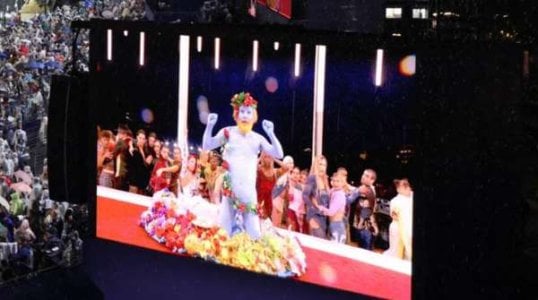Olympics officers apologise over opening ceremony controversies
By
Danielle F.
- Replies 66
The 2024 Paris Olympic Games are a global spectacle and a celebration of human achievement and international camaraderie.
However, the grandeur of the event does not make it immune to controversy or error.
The latest Olympic opening ceremony was no exception, as it became the centre of heated backlash from spectators worldwide.
The ceremony, designed to dazzle and unite, sparked outrage among Christian and Catholic religious groups.
The bone of contention was a banquet scene that bore a resemblance to Leonardo da Vinci's The Last Supper.
The scene featured an actor portraying the Greek god Dionysus, surrounded by a table full of drag queens.
Religious groups condemned the act and called it 'a mockery of Christianity'.
Theatre director Thomas Jolly, known for his avant-garde approach, choreographed the scene.
While the intention was to celebrate community spirit, the execution struck a chord with viewers who felt their religious beliefs were disrespected.
In response to the uproar, 2024 Olympics spokesperson Anne Descamps extended an olive branch.
'There was never an intention to show disrespect to any religious group. The opening ceremony tried to celebrate community tolerance. We believe we achieved this ambition,' Descamps shared.
'If people have taken any offence, we are really sorry.'
The International Olympic Committee (IOC) echoed this sentiment and supported Descamps's apology.
'In the daily press briefing, the organising committee said that there was never any intention to show disrespect towards any religious group or belief,' they reiterated.
'The organising committee also said that if anyone was offended by certain scenes, this was completely unintentional and they were sorry.'
Unfortunately, the banquet scene was not the only mishap that marred the ceremony.
The Olympic flag was hoisted upside down during the opening ceremony's final act, which became the subject of social media chatter.
On the other hand, South Korean athletes experienced an identity crisis after being introduced as the North Korean delegation.
As their boat sailed on the Seine, the announcer referred to them as the Democratic People's Republic of Korea—the official name for North Korea—in both French and English.
The organisers promptly apologised for the mistake.
IOC president Thomas Bach assured he would meet with South Korea's leader, Yoon Suk-Yeol, to address the incident.
These blunders serve as a reminder that even the most meticulously planned events can go awry.
These incidents also highlight the importance of cultural sensitivity and the need to anticipate how global audiences might perceive creative expression.

How do you feel about the Olympic Games opening ceremony? We invite you to share your thoughts and insights in the comments section below.
Meanwhile, stay updated with the 2024 Olympic Games and see Australia's standings here.
However, the grandeur of the event does not make it immune to controversy or error.
The latest Olympic opening ceremony was no exception, as it became the centre of heated backlash from spectators worldwide.
The ceremony, designed to dazzle and unite, sparked outrage among Christian and Catholic religious groups.
The bone of contention was a banquet scene that bore a resemblance to Leonardo da Vinci's The Last Supper.
The scene featured an actor portraying the Greek god Dionysus, surrounded by a table full of drag queens.
Religious groups condemned the act and called it 'a mockery of Christianity'.
Theatre director Thomas Jolly, known for his avant-garde approach, choreographed the scene.
While the intention was to celebrate community spirit, the execution struck a chord with viewers who felt their religious beliefs were disrespected.
In response to the uproar, 2024 Olympics spokesperson Anne Descamps extended an olive branch.
'There was never an intention to show disrespect to any religious group. The opening ceremony tried to celebrate community tolerance. We believe we achieved this ambition,' Descamps shared.
'If people have taken any offence, we are really sorry.'
The International Olympic Committee (IOC) echoed this sentiment and supported Descamps's apology.
'In the daily press briefing, the organising committee said that there was never any intention to show disrespect towards any religious group or belief,' they reiterated.
'The organising committee also said that if anyone was offended by certain scenes, this was completely unintentional and they were sorry.'
Unfortunately, the banquet scene was not the only mishap that marred the ceremony.
The Olympic flag was hoisted upside down during the opening ceremony's final act, which became the subject of social media chatter.
On the other hand, South Korean athletes experienced an identity crisis after being introduced as the North Korean delegation.
As their boat sailed on the Seine, the announcer referred to them as the Democratic People's Republic of Korea—the official name for North Korea—in both French and English.
The organisers promptly apologised for the mistake.
IOC president Thomas Bach assured he would meet with South Korea's leader, Yoon Suk-Yeol, to address the incident.
These blunders serve as a reminder that even the most meticulously planned events can go awry.
These incidents also highlight the importance of cultural sensitivity and the need to anticipate how global audiences might perceive creative expression.
Key Takeaways
- The 2024 Paris Olympics opening ceremony organisers issued an apology following backlash from religious groups over a scene resembling The Last Supper.
- Religious groups considered the inclusion of the Greek god Dionysus and drag queens as a mockery of Christianity.
- The 2024 Olympics spokesperson assured that there was no intention to disrespect any religious group, and the ceremony aimed to celebrate community spirit.
- Several other blunders occurred during the opening ceremony, including the Olympic flag being raised upside down and South Korean athletes being introduced as North Korean delegates.
Meanwhile, stay updated with the 2024 Olympic Games and see Australia's standings here.









